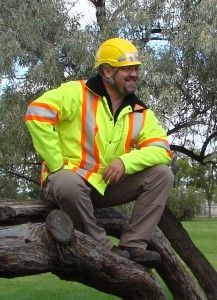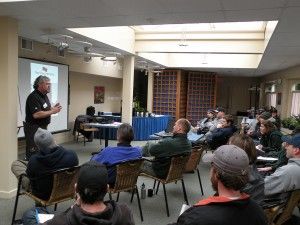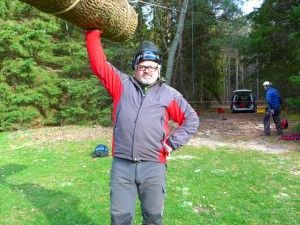What Makes a Good Instructor?
Recently printed in the Continental Connection newsletter.
What sets one instructor apart from the majority? Arboriculture Canada Training & Education Ltd. has developed a process for training and mentoring instructors that serves to do exactly that.
 As owner and lead instructor of ACTE, Dwayne Neustaeter began to train and mentor instructors many years ago. He has developed a train the trainer program that takes individuals through exercises that challenge them to develop the presentation and communication skills necessary to not only facilitate effective learning in attendees, but also to make learning engaging, entertaining and fun.
As owner and lead instructor of ACTE, Dwayne Neustaeter began to train and mentor instructors many years ago. He has developed a train the trainer program that takes individuals through exercises that challenge them to develop the presentation and communication skills necessary to not only facilitate effective learning in attendees, but also to make learning engaging, entertaining and fun.
Dwayne sends out weekly emails (Platoon Weekly) to a team of over 100 people who have attended past Train the Trainer events with him to remind them of the principles of effective instruction and presentation. If you have ever had the good fortune of attending a course, session or presentation conducted by Dwayne, chances are you were engaged, entertained and you remember a good deal of what you learned during that session.
If you are currently a leader in your organization, whether a supervisor, a crew foreman, a trainer or the owner – you might be interested in some of the tips that we use when training and mentoring our instructors. We thought we would share some of them in this issue with you.
A fundamental concept to good instruction we use to help instructors remember how important the context of a learning environment is – is that “DATA doesn’t MATTA”. This simply means that the context of a teaching environment is just as important to the learning environment as the data or content of the course or session. As Dwayne recently explained in a message to platoon members:
I learned a unique way to teach a lesson about tree assessment from Alex Shigo. He would ask a group to list above ground tree parts, and the lists would be quite vast. Then, he would ask everythone to list below ground tree parts, generally called roots, and the list would pale by comparison. The lesson – there is a lot more known about the above ground tree parts than there is about the below ground tree parts. This becomes a lesson in tree biology. However, I can also compare this lesson to teaching. There is a lot of emphasis put on the data or content aspect of teaching, and yet, all parts are important in any system. If you focus most heavily in one area over another, you will have an imbalance, so Data (Content) does Matta, but not at the expense of Context. They both need to be considered equally for there to be success in learning. Teaching is like tree assessment and we have to consider all parts above and below ground, content and context, in order to make reasonable and reliable assessments and lesson plans. I am as passionate about content and context management in the classroom as I am about my passion to learn and understand trees above and below ground.

Dwayne attended a program called “Ultimate Leadership Camp” with Peak Potentials in August of this year, together with his friend and colleague Andrew Hordyk. This is what he had to say about that experience:
This past week Andrew and I attended a five day course called ‘Ultimate Leadership Camp’. This camp was delivered by the same instructor and company that I took my trainer courses from years ago, the courses from which I developed the content and format for the instructor/trainer intensives that Arboriculture Canada delivers. It was a great course and one of the biggest things I learned was that as trainers or instructors we are also leaders – this goes hand in hand . . . like air and light, sun and heat or smell and taste. The only difference between a leader and an instructor/trainer is timing and appointment. There are times when you are the instructor/trainer by designation, however leaders are chosen by those they are together with. Leadership is one of those things that other gives you – like your reputation. The following is a list of some characteristics of a leader we learned at the course. I challenge you to practice them in your life and watch what happens.
Accountable – take responsibility for results
Decisive – make decisions quickly
Courageous- act in spite of fear
Assertive – speak with authority, not aggressiveness
Calm- unemotional regardless of situation
Optimistic – believe things will work out
Confident – trust and believe in yourself
Compassionate – be understanding and care for others
Creative – plan, strategize and problem solve
Flexibility – adapt and be willing to embrace change
Integrity- be reliable and do what you say . . . ALWAYS
Passionate- never quit or give up
Action – act quickly and concisely when it is safe and secure
Pro-Active – take action on problems or opportunities as you see them develop . . . make things occur.
There are many important components of planning a training program, lesson plan, meeting or event that will facilitate and allow for trust and openness amongst participants and effective lasting learning. Dwayne addresses them one by one in his trainer programs, as well as through his weekly messages. The following is a weekly message that he wrote just prior to delivering a recent Chainsaw Train the Trainer event as he was preparing.
This week as I prepared for the Chainsaw Train the Trainer program, I was thinking about all the past classes and the memories I have each and every intensive I have been a part of. I look forward to the learning that I know I will gain from working with new people with new experiences. I am always reminded of the story about the mental tool box. I first heard this story from Tim Ard and I have never forgotten it and have told it myself many times over.
Training and education truly is a journey, not a destination, and like the old toolbox in your garage or in your truck, your mental toolbox is dialy exposed to new experiences and interactions, particularly at a training event like a seminar or course. It is important to remind people that you are teaching or leading that your purpose is simply to add to their mental toolbox. Many of us had a junk drawer of tools, trinkets, special wrenches from the last BBQ or children’s toy you assembled. The box gets bigger and bigger and for the most part you don’t throw much of it away, even though you may not use each tool very often or ever. Why don’t you throw anything away? The reason is because you know what that tool is for . . . and you might use it one day. Experiences, training and education is a lot like that. Each learning is valuable and means something specific to you. When you are in a leadership or teaching position, you can start with this analogy and encourage enrollment from the class. (by asking them to mimic the opening of the brain with their hands above their heads . . .) It is a good way to let the audience know you are there to help, and more importantly you can end the session by reminding them of the toolbox analogy and request them to do one thing. What is that request? Ask everyone to simply keep an open mind because like a toolbox, if it is closed, nothing can get in!
It is such a great analogy because it also illustrates the important connection between training, education, information and experience, and how one without the other is not complete. So much of how we learn is through synthesis of knowledge into practice – experience is the qualifier. True or True!

Part of our trainer program involves the way that an instructor begins or introduces a program to a group of attendees. They are taught to do the following things:
- Scan
- Welcome, acknowledge, edify and name of talk
- W.I.I.F.M. (What’s in it for me?)
- E.T.R. (Earn the Right)
Each trainer is taught in detail the importance of each of these steps and examples of how to implement and practice this in relation to the topics of the content. Dwayne wrote a short lesson on Earn The Right (E.T.R.) as follows:
How many of you have learned a lesson or gained respect for someone from listening to their story?
E.T.R. is where you tell a story that relates and applies to the topic you are teaching. It is a true story that explains why you are qualified to teach the course or present the topic. The story should be designed to give you the right to present on the topic and it should make your students understand that you know the material and have the experience to back up what you are going to be talking about. A good ETR is passionate and authentic, remember your truth is in your passion, and people don’t care what you know until they know that you care. An ETR can include or be a relational story about something you witnessed that impacted your life and/or effected change in you.
Your ETR builds confidence and ties in with your WIIFM. After your ETR your students are even more excited to hear what you have to say. Your ETR is personal and it is where you begin to establish a fundamental trust with your audience by making yourself vulnerable. It often is a story of a challenge or character building experience in which you learned a hard valuable lesson, a lesson you want to help other’s learn more easily. The basic concept is that we don’t have enough time to make all of the mistakes ourselves and that experience is one of our most valuable teachers, and so the more we can learn from others experiences the better, TRUE or TRUE.
A good ETR shows a willingness and more importantly a commitment to learn and share, like in all things practice and stick with stories that have worked well in the past. Your ETR is about experiences, it gives a relational human quality that resonates with those listening, it helps others relate and connect with you.
These are all snippets of advice from a master of instruction. Dwayne has spent many years teaching around the world to people of many ages, walks of life and occupations. He connects with people in a relational way and he learns from everyone he interacts with. He has a gift of teaching – and those of you that have learned from him can understand his passion.
These are some of the principles that Arboriculture Canada nurtures in the instructors we use to teach our programs. Dwayne and our team of instructors looks forward to working with more learners in 2014, and thanks all those attendees in 2013 for your participation, your passion and your commitment to learning!
